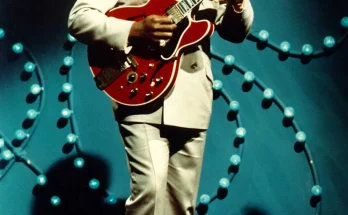B.B. King’s Lucille: The Story Behind the Guitar
If the blues had a heartbeat, it’d be the sweet, stinging cry of B.B. King’s guitar, Lucille. More than just wood and strings, Lucille was a lifeline—a companion that carried the King of the Blues through decades of smoky juke joints, sweaty stages, and soul-baring solos. But where did she come from, and why does her name echo louder than most six-string legends? Buckle up, because this is a tale of fire, love, and a sound that shaped music forever.

The Night Lucille Was Born
It’s 1949. Twist, Arkansas. A frigid winter night turns hell-hot when a dance hall catches fire. Picture it: a packed crowd, a kerosene heater knocked over in a brawl, flames licking the walls. B.B.—then a young Riley B. King—makes it out, only to realize his $30 Gibson guitar is still inside. He bolts back into the inferno, dodging death to save it. Later, he learns the fight that sparked the blaze was over a woman named Lucille. Right then, he swore every guitar he’d ever play would carry her name—a reminder of the risk, the passion, and the blues itself.
That moment wasn’t just about a guitar; it was B.B. staking his soul on the line. Lucille became his voice when words weren’t enough, a co-conspirator in every trembling note.
What Made Lucille Sing
Lucille wasn’t one guitar—she was many, mostly Gibson semi-hollows like the ES-335 or ES-355. B.B. tweaked her over the years, ditching the f-holes to kill feedback and letting her purr clean and loud. He’d bend those strings like he was wringing out his heart, pairing her with a Fender Twin or Lab Series amp for that warm, biting tone. It’s why “The Thrill Is Gone” cuts so deep—Lucille doesn’t just play the blues; she feels it.
Fans geek out over the specs, but it was B.B.’s hands that made her magic. He once said, “I don’t do chords—I let Lucille do the talking.” That single-note style, drenched in vibrato, turned her into a siren call no one could ignore.
The Legacy of Lucille
Lucille wasn’t just B.B.’s—she became a symbol. When he died in 2015, Gibson honored him with custom Lucille models, sleek black beauties with his name in pearl on the headstock. She’s been stolen, recovered, and even retired to museums, but her spirit lives in every blues player who’s ever chased that tone. From Eric Clapton to Joe Bonamassa, Lucille’s DNA is in their riffs, proof she’s more than a guitar—she’s a dynasty.
Why Lucille Still Matters
Today, Lucille’s story hits harder than ever. In a world of auto-tuned pop and disposable tracks, she’s a raw, real relic of a time when music meant survival. She’s the sound of late-night regret, of joy snatched from pain. For blues fans, she’s a call to dig deeper—into the roots, the players, the soul.
So next time you hear B.B. wail through “Stormy Monday” or “Every Day I Have the Blues,” tip your hat to Lucille. She’s the queen who gave the King his crown.
What’s your favorite B.B. King track with Lucille front and center? Drop it in the comments—we’re building the ultimate Blues Garage playlist!



